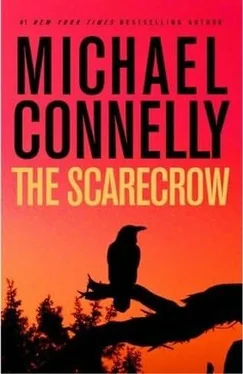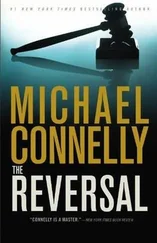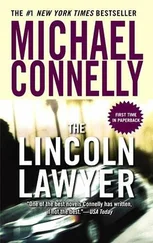
Michael Connelly
The Scarecrow
To James Crumley, for The Last Good Kiss
Carver paced in the control room, watching over the front forty. The towers were spread out before him in perfect neat rows. They hummed quietly and efficiently and even with all he knew, Carver had to marvel at what technology had wrought. So much in so little space. Not a stream but a swift and torrid river of data flowing by him every day. Growing in front of him in tall steel stalks. All he needed to do was to reach in, to look and to choose. It was like panning for gold.
But it was easier.
He checked the overhead temperature gauges. All was perfect in the server room. He lowered his eyes to the screens on the workstations in front of him. His three engineers worked in concert on the current project. An attempted breach thwarted by Carver’s skill and readiness. Now the reckoning.
The would-be intruder could not penetrate the walls of the farmhouse, but he had left his fingerprints all over it. Carver smiled as he watched his men retrieve the bread crumbs, tracing the IP address through the traffic nodes, a high-speed chase back to the source. Soon Carver would know who his opponent was, what firm he was with, what he had been looking for and the advantage he hoped to gain. And Carver would take a retaliatory action that would leave the hapless contender crumpled and destroyed. Carver showed no mercy. Ever.
The mantrap alert buzzed from overhead.
“Screens,” Carver said.
The three young men at the workstations typed commands in unison, which hid their work from the visitors. The control room door opened and McGinnis stepped in with a man in a suit. Carver had never seen him before.
“This is our control room and through the windows there, you see what we call the ‘front forty,’ ” McGinnis said. “All of our colocation services are centered here. This is primarily where your firm’s material would be held. We have forty towers in here holding close to a thousand dedicated servers. And, of course, there’s room for more. We’ll never run out of room.”
The man in the suit nodded thoughtfully.
“I’m not worried about room. Our concern is security.”
“Yes, this is why we stepped in here. I wanted you to meet Wesley Carver. Wesley wears a number of hats around here. He is our chief technology officer as well as our top threat engineer and the designer of the data center. He can tell you all you need to know about colocation security.”
Another dog and pony show. Carver shook the suit’s hand. He was introduced as David Wyeth of the St. Louis law firm Mercer and Gissal. It sounded like crisp white shirts and tweed. Carver noticed that Wyeth had a barbecue stain on his tie. Whenever they came into town McGinnis took them to eat at Rosie’s Barbecue.
Carver gave Wyeth the show by rote, covering everything and saying everything the silk-stocking lawyer wanted to hear. Wyeth was on a barbecue-and-due-diligence mission. He would go back to St. Louis and report on how impressed he had been. He would tell them that this was the way to go if the firm wanted to keep up with changing technologies and times.
And McGinnis would get another contract.
All the while he spoke, Carver was thinking about the intruder they had been chasing. Out there somewhere, not expecting the come-uppance that was speeding toward him. Carver and his young disciples would loot his personal bank accounts, take his identity and hide photos of men having sex with eight-year-old boys on his work computer. Then he would crash it with a replicating virus. When the intruder couldn’t fix it he would call in an expert. The photos would be found and the police would be called.
The intruder would no longer be a concern. Another threat kept away by the Scarecrow.
“Wesley?” McGinnis said.
Carver came out of the reverie. The suit had asked a question. Carver had already forgotten his name.
“Excuse me?”
“Mr. Wyeth asked if the colocation center had ever been breached.”
McGinnis was smiling, already knowing the answer.
“No, sir, we’ve never been breached. To be honest, there have been a few attempts. But they have failed, resulting in disastrous consequences for those who tried.”
The suit nodded somberly.
“We represent the cream of the crop of St. Louis,” he said. “The integrity of our files and our client list is paramount to all we do. That’s why I came here personally.”
That and the strip club McGinnis took you to, Carver thought but didn’t say. He smiled instead but there was no warmth in it. He was glad McGinnis had reminded him of the suit’s name.
“Don’t worry, Mr. Wyeth,” he said. “Your crops will be safe on this farm.”
Wyeth smiled back.
“That’s what I wanted to hear,” he said.
Every eye in the newsroom followed me as I left Kramer’s office and walked back to my pod. The long looks made it a long walk. The pink slips always came out on Fridays and they all knew I had just gotten the word . Except they weren’t called pink slips anymore. Now it was an RIF form-as in Reduction in Force.
They all felt the slightest tingle of relief that it hadn’t been them and the slightest tingle of anxiety because they still knew that no one was safe. Any one of them could be called in next.
I met no one’s stare as I passed beneath the Metro sign and headed back into podland. I moved into my cubicle and slipped into my seat, dropping from sight like a soldier diving into a foxhole.
Immediately my phone buzzed. On the read-out I saw that it was my friend Larry Bernard calling. He was only two cubicles away but knew if he had come to me in person it would have been a clear signal for others in the newsroom to crowd around me and ask the obvious. Reporters work best in packs like that.
I put on my headset and picked up the call.
“Hey, Jack,” he said.
“Hey, Larry,” I said.
“So?”
“So what?”
“What did Kramer want?”
He pronounced the assistant managing editor’s name Crammer, which was the nickname bestowed on Richard Kramer years earlier when he was an assignment editor more concerned with the quantity than the quality of news he got his reporters to produce for the paper. Other variations of his full or partial name evolved over time as well.
“You know what he wanted. He gave me notice. I’m out of here.”
“Holy fucking shit, you got pinked!”
“That’s right. But remember, we call it ‘involuntary separation’ now.”
“Do you have to clear out right now? I’ll help you.”
“No, I’ve got two weeks. May twenty-second and I’m history.”
“Two weeks? Why two weeks?”
Most RIF victims had to clear out immediately. This edict was instated after one of the first recipients of a layoff notice was allowed to stay through the pay period. Each of his last days, people saw him in the office carrying a tennis ball. Bouncing it, tossing it, squeezing it. They didn’t realize that each day it was a different ball. And each day he flushed a ball down the toilet in the men’s room. About a week after he was gone the pipes backed up, with devastating consequences.
“They gave me extra time if I agreed to train my replacement.”
Larry was silent for a moment as he considered the humiliation of having to train one’s own replacement. But to me two weeks’ pay was two weeks’ pay I wouldn’t get if I didn’t take the deal. And besides that, the two weeks would give me time to say proper good-byes to those in the newsroom and on the beat who deserved them. I considered the alternative of being walked out the door by security with a cardboard box of personal belongings even more humiliating. I was sure they would watch me to make sure I wasn’t carrying tennis balls to work, but they didn’t have to worry. That wasn’t my style.
Читать дальше













